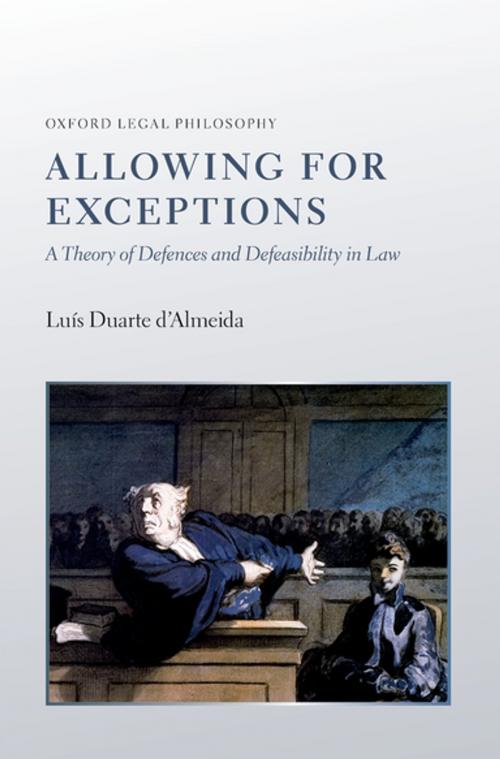Allowing for Exceptions
A Theory of Defences and Defeasibility in Law
Nonfiction, Reference & Language, Law, Jurisprudence, Religion & Spirituality, Philosophy| Author: | Luís Duarte d'Almeida | ISBN: | 9780191508998 |
| Publisher: | OUP Oxford | Publication: | March 26, 2015 |
| Imprint: | OUP Oxford | Language: | English |
| Author: | Luís Duarte d'Almeida |
| ISBN: | 9780191508998 |
| Publisher: | OUP Oxford |
| Publication: | March 26, 2015 |
| Imprint: | OUP Oxford |
| Language: | English |
You find yourself in a court of law, accused of having hit someone. What can you do to avoid conviction? You could simply deny the accusation: 'No, I didn't do it'. But suppose you did do it. You may then give a different answer. 'Yes, I hit him', you grant, 'but it was self-defence'; or 'Yes, but I was acting under duress'. To answer in this way-to offer a 'Yes, but. . .' reply-is to hold that your particular wrong was committed in exceptional circumstances. Perhaps it is true that, as a rule, wrongdoers ought to be convicted. But in your case the court should set the rule aside. You should be acquitted. Within limits, the law allows for exceptions. Or so we tend to think. In fact, the line between rules and exceptions is harder to draw than it seems. How are we to determine what counts as an exception and what as part of the relevant rule? The distinction has important practical implications. But legal theorists have found the notion of an exception surprisingly difficult to explain. This is the longstanding jurisprudential problem that this book seeks to solve. The book is divided into three parts. Part I, Defeasibility in Question, introduces the topic and articulates the core puzzle of defeasibility in law. Part II, Defeasibility in Theory, develops a comprehensive proof-based account of legal exceptions. Part III, Defeasibility in Action, looks more closely into the workings of exceptions in accusatory contexts, including the criminal trial.
You find yourself in a court of law, accused of having hit someone. What can you do to avoid conviction? You could simply deny the accusation: 'No, I didn't do it'. But suppose you did do it. You may then give a different answer. 'Yes, I hit him', you grant, 'but it was self-defence'; or 'Yes, but I was acting under duress'. To answer in this way-to offer a 'Yes, but. . .' reply-is to hold that your particular wrong was committed in exceptional circumstances. Perhaps it is true that, as a rule, wrongdoers ought to be convicted. But in your case the court should set the rule aside. You should be acquitted. Within limits, the law allows for exceptions. Or so we tend to think. In fact, the line between rules and exceptions is harder to draw than it seems. How are we to determine what counts as an exception and what as part of the relevant rule? The distinction has important practical implications. But legal theorists have found the notion of an exception surprisingly difficult to explain. This is the longstanding jurisprudential problem that this book seeks to solve. The book is divided into three parts. Part I, Defeasibility in Question, introduces the topic and articulates the core puzzle of defeasibility in law. Part II, Defeasibility in Theory, develops a comprehensive proof-based account of legal exceptions. Part III, Defeasibility in Action, looks more closely into the workings of exceptions in accusatory contexts, including the criminal trial.















